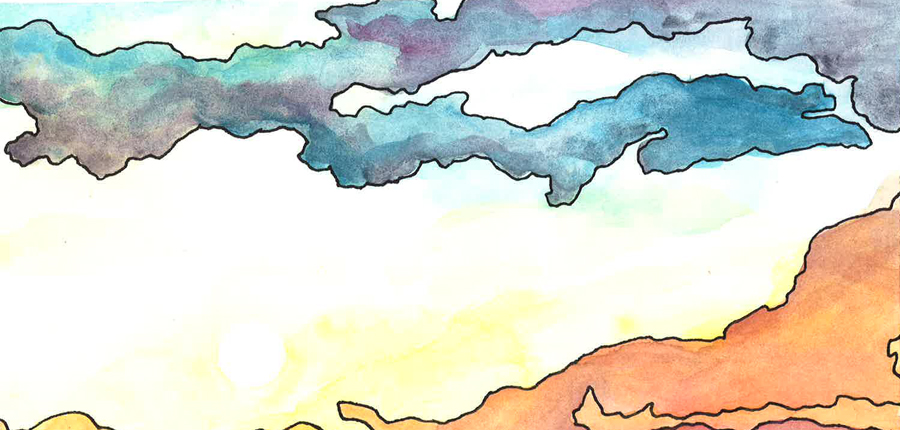I sit, this morning, propped up in bed, given a couple of hours to spend as I wish. And what I wish most of all is to reconnect with you, my girls, in this over-the-top, crazy, transitional, less-than-controllable time in my life. And since I’m as confused as anyone about why everything seems so bone-jarringly bumpy right now, I thought I’d ask myself a few questions to see if I can clear my messy mind.
Diane: What do you see from where you sit?
Me: A worn-at-the-edges sheet covering my window, clothes hanging to dry draped all over my dresser, a suitcase half packed, a desk piled with stuff that needs doing right-now-this-minute!… and baby Scarlet’s new red shoes pattering by while she chatters joyfully to her Amma about who-knows-what.
Diane: Why is your life in upheaval?
Me:
1. We just moved into a not-yet-finished house.
2. A few days after the move, our daughter and her family moved in with us for a couple of weeks.
3. All their boxes joined ours in our garage, leaving the smallest pathway possible to the jury-rigged washer and dryer.
4. Two days ago Brook, Elizabeth and Duke climbed into a moving truck to caravan to their new home in L.A.
5. I’ve been teary over the move for weeks.
6. Scarlet stayed with us because her parents couldn’t quite fathom the 20-plus hour drive down I-5 with a two year old.
7. And I couldn’t quite fathom saying good-bye to the two-year old. And like said two-year-old, I’m employing strategic delay tactics.
8. Soon I’ll fly with Scarlet to L.A. I’ll stay a few days to help Elizabeth get settled and spend some time with my other daughter, Rebekah, who lives just 15 minutes away.
9. I’ll be home for one day, then fly to San Francisco to teach an Intentional conference with Phil at Reality S.F. to a really great group of young parents wanting more than anything to raise children who are passionate about Jesus.
10. Then we’ll rent a car and go see my parents in the mountains east of San Francisco for a couple of days, checking in on both of them as their health declines, wondering aloud with them what the future holds.
Diane: Just normal life stuff, it sounds like. What’s the big deal?
Me: I am supposed to be writing a book… and writing for this blog. And I’m not.
Diane: Well, girl, you’d better just work harder and longer and faster and smarter! Clearly you’re not doing what you should… you’re not enough.
Me: Hush! And stop all that incessant scolding!
I am listening to the Spirit of God, not to all the worries and fear that suffocate my spirit and leave me crabby and anxious.
He promises rest, and peace, and strength, and honor to His name. He says He’s enough so I don’t have to be. (Ps 23).
And He says things like: “The LORD leads with unfailing love and faithfulness… He will show them the path they should choose… Delight yourself in the LORD and He will give you the desires of your heart…”[1]
Diane: Oh, sorry. I thought scolding myself was the best way to avoid failure. You know, motivation to get to it.
Me: I am learning that scolding myself makes it all about me. As if it’s up to me to control every aspect of my life. As if worry whips me into shape.
I am choosing to take those runaway worries captive— catching the fiery arrows before they sink deep.
I am determining to stay sheltered close to the Shadow of the Almighty so that He can be to me all that I need.
I am recognizing that His way of working through me is different than my way of intimidating myself into productivity.
Diane: What advice do you have for other women in a season of too-much-to-do?
Me: Carve out space to listen closely to the Master. Is it His voice that is driving you? Or could it be the spirit of guilt and obligation? In busy times we need to purposefully listen… to Him. And when life is hectic and less than perfectly tidy we actually need more time for the silence.
Diane: Then what?
Me: Do each day with determined joy, deciding to hope, to trust, to believe God. At the end of the day go back and thank Him for His presence in each hour. See Him and listen to Him. His presence makes all the difference in our days.
Diane: Have you heard or read anything lately that is helping you figure this out?
Me: I just closed the last page of a book that is so full of wisdom I want every woman to read it. It’s called Restless, by Jennie Allen. I plan to write a full review next week (but who knows, at this rate?!), but for now a quote or two:
“As you become more secure in Christ… you will feel a new tension surface: a life that feels semi-chaotic. You realize that what you had been calling “balance” in your family was really a determined effort to control your life at all costs. You see, God never promises balance. So this new life that feels semi-chaotic is likely a symptom of a couple attempting to follow the leading of the Holy Spirit.” (from the author’s husband)
“I wanted to be comfortable more than I wanted God’s will for my days.” (from the author)
And this…
“Great people don’t do great things. God does great things with surrendered people.”
So here I am surrendering the order I crave. Not passively shrugging my shoulders and simmering below the surface… but really surrendering to the One who knows me and wants to do great things through me— in spite of my mixed up, semi-psychotic self.
I’m surrendering my daughter too. To run with the Spirit into all the beautiful, chaotic, mess He wants to use in her, through her, for her.
And I’m praying for you, my girls. Because I believe that God has great things for you… things only you can do… things that won’t get done unless you choose to surrender, to listen, to face your fears, to let go of comfort, and to fling yourself unreservedly after the One who is leading you.
From my heart,
Diane
P.S. You know I’m needing to hear from you too! Are you learning to delight in the chaos of a life lived hard after Jesus? Can you tell us about it? Please?








































